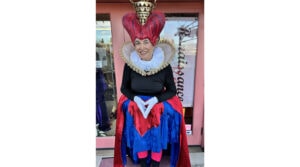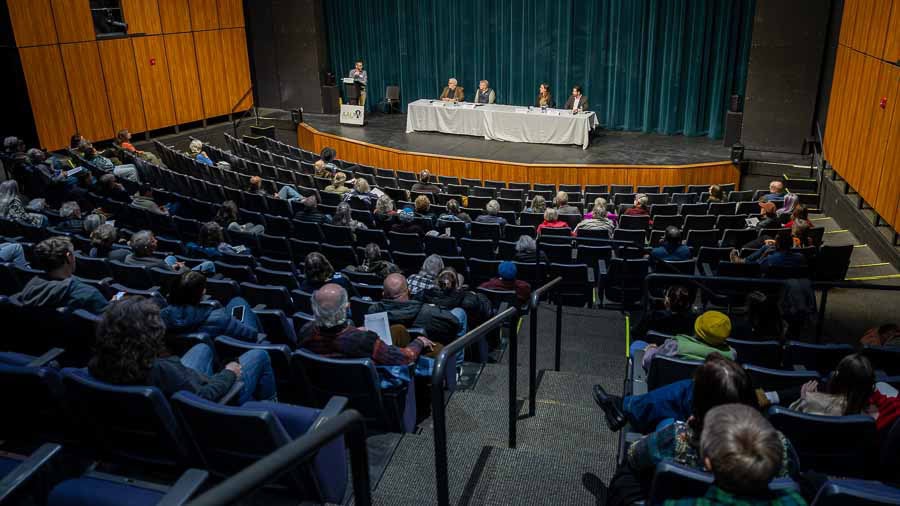A mainstay with OSF for 17 seasons, he reunites with festival alumni in the Rogue Theater Company production of Beckett’s classic tragicomedy
By Jim Flint
After an eight-year absence from the stage, actor Jonathan Haugen is stepping back under the lights with Rogue Theater Company’s production of “Waiting for Godot.” Samuel Becket’s classic will run Oct. 15-Nov. 2 on the Richard L. Hay Center stage at Grizzly Peak Winery, 1600 E. Nevada St., Ashland.
For Haugen, who worked 17 seasons as a member of the Oregon Shakespeare Festival, the return is both a personal milestone and a reunion with longtime collaborators.
“The primary reason I am doing this show is for the opportunity to work with Derrick Weeden, Ray Porter and director Robynn Rodriguez,” Haugen said. “The three of us go back over 30 years together performing in theaters up and down the West Coast. They are my muses, my confidants, my comrades — battle weary but still believing in the power of great literature and live theater.”
From Arizona to Ashland
Haugen was born and raised in Phoenix, Arizona, in a household steeped in creativity.
“Both of my parents worked with their hands and they believed the arts were the great civilizing force and discipline for kids. We all took music lessons, did carpentry, sewed. Our house was filled with classical literature and music,” he recalled.
His own love affair with the stage began early. In fourth grade, he played Grace Poole in a summer production of “Jane Eyre.”
“I was hooked,” he said.
Attending performances at the American Conservatory Theater in San Francisco and the Oregon Shakespeare Festival during the late 1970s sealed his path. “Those experiences made me want to be a classical stage actor.”
Building a career
After training at California Institute for the Arts, Haugen launched his professional career in Arizona, landing a role as a dancing bingo card for a Phoenix grocery store commercial.
“I was fired from the TV spot because of my bad dancing, but they kept my voice for the radio ad.”
His first professional theater roles followed in the late 1980s at the Kern Shakespeare Festival in Bakersfield, California. Haugen landed roles in Shakespeare’s history and comedy plays. He played Hotspur in “Henry IV, Part 1” and Speed in “Two Gentlemen of Verona.”
Over the decades, Haugen built a wide-ranging résumé, ranging from Brutus in “Julius Caesar” to Henry Higgins in “My Fair Lady.” Yet some roles stand out above the rest.
“Playing the title role in ‘Doctor Faustus’ on the Elizabethan stage with my dear friend Ray Porter as Mephistopheles and directed by the incomparable Jim Edmondson was a singular highlight,” he said. Another meaningful moment came with “Handler” by Robert Schenkkan, opposite Robynn Rodriguez.

Haugen also relished the challenge of premiering new works, though it came with its own hurdles.
“You have to work much harder in some respects on new plays because the script is constantly changing, he said. “There are always new pages to memorize and time is short. You also can be sure if it transfers to New York, you won’t be going.”
His years at OSF left a lasting impression.
“I feel grateful and humbled at being a part of honoring the 90-year tradition of OSF,” he said. “We stand on the shoulders of giants.”
A challenging hiatus
Haugen’s last stage appearance was in 2017. Shortly afterward, he was diagnosed with Meniere’s disease, a bilateral inner ear disorder that affects hearing and balance.
“It affects all aspects of my life,” he said. “That is why I stepped away from performing.”
In turn, he turned his creative energies elsewhere, collaborating with his brother to restore two historic homes in Ashland.
“It’s something we always talked about doing together, and it is thrilling to be able to realize this dream.”
At home, Haugen and his husband Eddie stay busy with three young cats — Hazel, Marvin and Sheila — who, he jokes, are “all fine actors.” He also indulges in writing, home projects and even elaborate Halloween decorating schemes.
Preparing for Lucky
Now, Haugen is ready to take on the role of Lucky in Beckett’s “Waiting for Godot.” Known for its existential humor and enigmatic characters, the role presents Haugen with a unique challenge.
Lucky is a slave to the character Pozzo. Unique in a play where most of the characters talk incessantly, Lucky utters only two sentences, one of which is more than 700 words long.
“I have been memorizing Lucky’s speech since the beginning of this year,” Haugen said. “It is one of the longest speeches in dramatic literature and not logical in any traditional sense, which makes memorization quite a task. That has been my entire focus so far, and we will see what we come up with when rehearsals begin.”
“Waiting for Godot” is an absurdist play about two tramps, Vladimir (Didi) and Estragon (Gogo), who meet daily by a tree to wait for the mysterious arrival of a man named Godot, who never shows up. During their endless wait, they encounter Pozzo, Lucky and a boy messenger who relays Godot’s promise that he will come tomorrow.
Haugen’s castmates include Tasso Feldman (Pozzo), Preston Robert Mead (The Boy), Ray Porter (Gogo) and Derrick Lee Weeden (Didi).
For more information and to purchase tickets, visit roguetheatercompany.com.
Looking head
Though he has found fulfillment outside of theater, Haugen’s passion for the stage hasn’t dimmed. He is already planning a new venture: producing and directing two one-acts — his original play, “The Legend of Pauline Munrid,” and an adaptation of Pushkin’s “The Queen of Spades” — at the Modern Prometheans space in Phoenix, Oregon, next year.
Meanwhile, he and his brother rent out the two houses they renovated, and Haugen makes sure the properties are kept in good shape.
“I have found a way to make a living that does not involve theater. That is very freeing and allows me to do projects that really excite me,” he said. “If audiences have fond memories of productions that I was involved in, that is reward enough.”
For now, audiences can look forward to seeing Haugen bring his formidable presence back to the stage in “Waiting for Godot.” After years away, he is returning to his first love with old friends at his side, and the same belief in the power of theater that first hooked him in the fourth grade.
Jim Flint’s Curtain Call column publishes on the second and fourth Mondays of the month. Email Jim at [email protected].



















